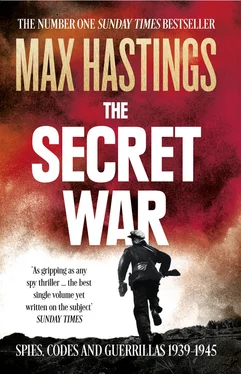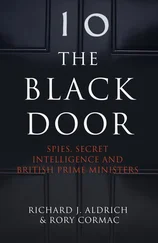From the day Winston Churchill became prime minister until Pearl Harbor nineteen months later, his foremost political purpose was to drag the United States into the war, because only thus could the embattled island hope to accomplish more than its own survival. To that end, the British sought the closest cooperation the Americans would countenance. They professed to wish to extend this to intelligence, but in truth sought a notably one-sided relationship, which protected most of Britain’s secrets. In the spring of 1940, Stewart Menzies asked the Canadian businessman Sir William Stephenson to try to open a link to J. Edgar Hoover, director of the FBI. Stephenson, eager for a top-table role for himself, set about this mission with a will, using an unlikely mutual acquaintance, the former world heavyweight boxing champion Gene Tunney, with whom he had sparred in France back in 1918. In those days the Canadian had been a fighter pilot, who went on to make a fortune before creating his own industrial intelligence network in the 1930s, from which he offered material to the British government. This opened a relationship with Desmond Morton and Dick Ellis of Broadway, which continued after the outbreak of war. Hoover, before meeting the ebullient Canadian, took care to secure White House approval. Stephenson reported back to London that the FBI chief was keen to cooperate with MI6, and had suggested that his visitor should secure some official title to formalise his status in the US.
Menzies promptly gave Stephenson a modest cover role as Passport Control Officer in New York, where he set up shop on 21 June 1940. Thereafter the Canadian built a substantial organisation which in January 1941 acquired the title of British Security Coordination. BSC, quartered on the 35th and 36th floors of the Rockefeller Center on Fifth Avenue, was charged with sabotaging Axis operations, liaising with the Americans and gathering intelligence about enemy activity. It also managed anti-Axis propaganda throughout the Americas. In its role as a flag-carrier for Britain and its spies, it enjoyed considerable success until the respective national intelligence services began to bypass BSC in favour of doing business with each other direct, in the spring of 1942 after the US came into the war.
New York became MI6’s most important out-station, from which its agents set forth to try to penetrate Axis-run companies and foreign embassies. BSC could claim credit for such coups as tipping off the FBI in November 1940, when a Mexico City informant revealed that four German ships intended to run the British blockade across the Gulf of Mexico: the US Navy stopped the ships. Likewise, J. Edgar Hoover warned BSC that the Italians intended to transfer to South America almost $4 million in cash, which might be used to bankroll sabotage. Two-thirds of the money got through, but a BSC agent alerted police in Mexico City about the smuggling operation: they opened the bags and confiscated $1.4 million. On the debit side, however, Stephenson was alleged to have recruited some frankly disreputable officers. Guy Liddell of MI5 fumed about one in particular, Ingram Fraser, who was alleged to have been ‘running a mistress in Washington DC who was supposed to be acting as an agent on the Finns. She was getting $500 a month for her flat and $500 for her services, all paid out of office funds.’ BSC wasted as much energy on absurdities as every other intelligence organisation: three of its cleverest officers – Oxford dons Freddie Ayer, Bill Deakin and Gilbert Hignet – spent weeks planning a response to a possible Japanese invasion of South America.
What mattered most, however, was Stephenson’s liaison role: he forged close personal relations with many prominent administration figures, and especially with Colonel William Donovan, who would become the most influential single personality in America’s wartime foreign intelligence operations. Donovan was a natural showman, where the other belligerents’ spymasters were men of the shadows or – in the case of Stalin’s intelligence chiefs – creatures of the night. Born in 1883, ‘Wild Bill’ rose from a poor Irish background in upstate New York to become a classmate of Franklin Roosevelt at Columbia Law School; he later became an influential friend of the president. He fought with Pershing against Pancho Villa, then commanded the New York Irish 69th Regiment on the Western Front in 1917–18, returning home as his nation’s most decorated soldier, a colonel with the Medal of Honor and a reasonably authentic reputation as a hero. Thereafter he fulfilled several fact-finding missions for the White House. Following the first of these, to the new Soviet Union in 1919, Donovan urged Washington against supporting White Russia, describing workers in Siberia as ‘yearning for Bolshevism’. As US Attorney for the Western District of New York, he became famous – or notorious – for his energetic enforcement of Prohibition. Later, though himself a Republican, he visited Abyssinia and Spain as an emissary for Roosevelt the Democrat. He returned home an implacable foe of Hitler, and advocate of US engagement in Europe.
In 1940 and 1941, Donovan made trips to London during which Stephenson ensured that he received red-carpet treatment, including lunch with the prime minister. Some British officers recoiled from the visitor’s brashness. Maj. Gen. John Kennedy, director of military operations, wrote in his diary: ‘Donovan … is extremely friendly to us & a shrewd and pleasant fellow and good talker. But I could not but feel that this fat & prosperous lawyer, a citizen of a country not in the war … possessed very great assurance to be able to lay down the law so glibly about what we and other threatened nations should & sh[oul]d not do.’
Donovan’s influence at the White House nonetheless ensured continuing British gratitude and goodwill. In September 1940 he persuaded Roosevelt to commit the US to a policy of intelligence collaboration with Churchill’s nation. When Godfrey, the director of naval intelligence, visited the US in May 1941 with his personal assistant Commander Ian Fleming, in New York the two men stayed at Donovan’s apartment. The admiral’s trip was not an unqualified success: he was shocked by the depth of hostility between the US Army and US Navy, and got little change out of Hoover, who was less interested in joining the war against the Axis than in securing the FBI’s monopoly control of the nation’s intelligence activities. In this, Hoover was unsuccessful. While his Bureau retained responsibility for counter-espionage – the role of MI5 in Britain – Godfrey and Stephenson played some part in convincing the Roosevelt administration that the country needed a new intelligence organisation, and that Donovan was the man to run it. From July 1941 he held the title of Coordinator of Information, though in reality his new Office of War Information was an embryo secret service, and he set about supervising its birth and precocious growth with energy and exuberance.
Donovan and Stephenson – the latter known in the US as ‘Little Bill’ rather than ‘Intrepid’, which was merely his telegraphic address – were buccaneers both, who shared credit for securing a reasonably free hand for British intelligence operations in the Americas, against the wishes of the FBI and the State Department. Their rapport did not, however, change an overarching reality: the wartime relationship between Britain and the United States was characterised by tensions and suspicions, merely painted over by the magnificent rhetoric of Churchill and Roosevelt. In 1940–41 the British were fighting for their lives while Americans were not, and indeed operated a cash-and-carry policy for the modest quota of weapons and supplies they sold to Churchill’s people. Most of America’s defence community had some respect for Britain, but little affection.
Читать дальше












